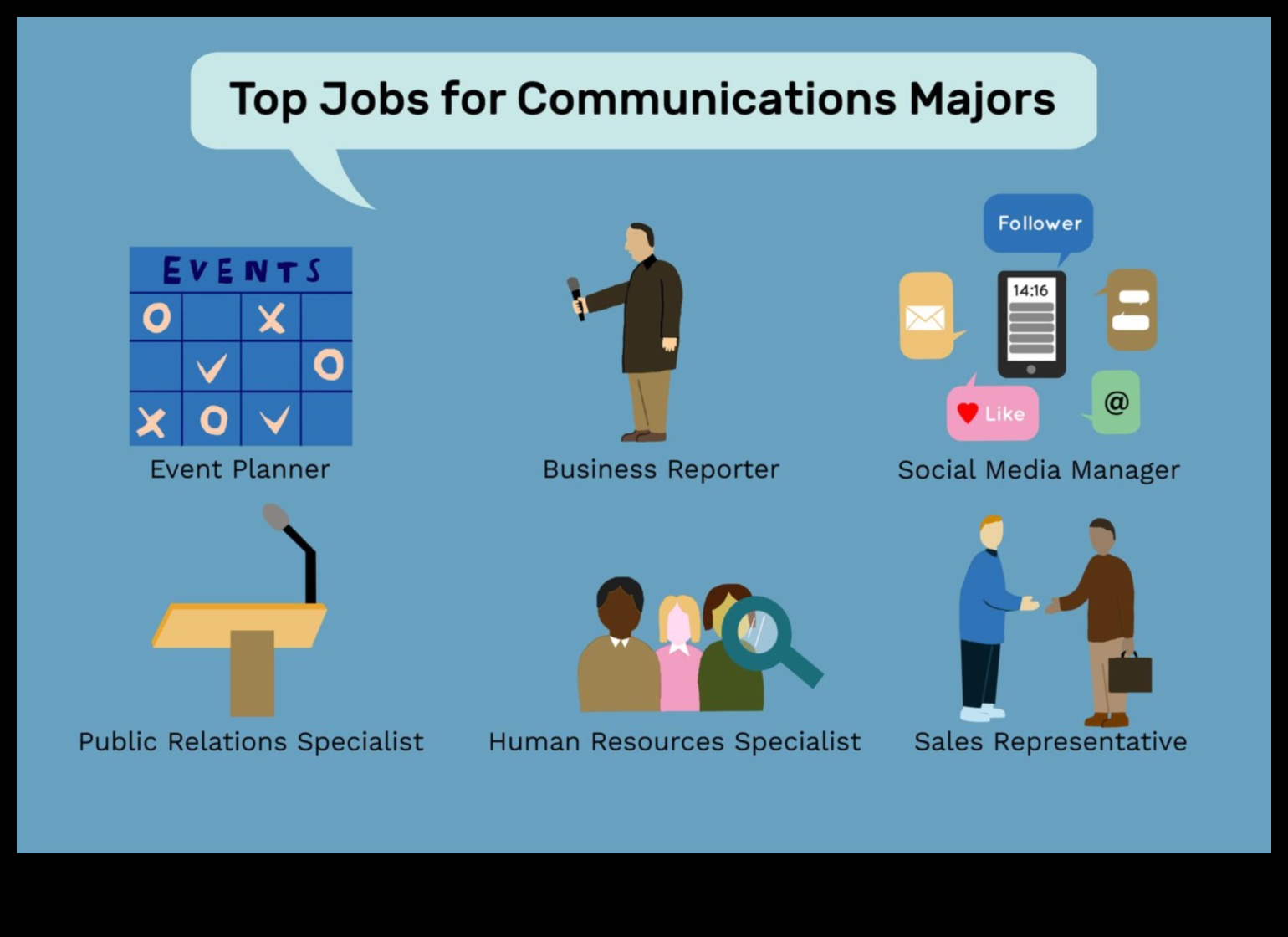
What Jobs Can You Get With a Degree in Communications?
A degree in communications can open up a wide range of career opportunities. Communication professionals are in high demand in a variety of industries, including business, marketing, public relations, and education. With a strong foundation in communication skills, you can find a job that allows you to use your creativity, critical thinking, and problem-solving skills to make a difference in the world.
Here are some of the specific jobs that you can get with a degree in communications:
- Public relations specialist
- Marketing manager
- Advertising account executive
- Editor
- Writer
- Speechwriter
- Media relations specialist
- Event planner
- Customer service representative
The salary and job outlook for communication jobs varies depending on the specific position and industry. However, according to the Bureau of Labor Statistics, the median annual salary for communication professionals is $61,150. The job outlook for this field is expected to grow by 10% from 2020 to 2030, which is faster than the average for all occupations.
If you’re interested in a career in communications, there are a few things you can do to prepare yourself. First, make sure to get a strong foundation in communication skills, such as writing, speaking, and listening. You can do this by taking courses in communications, public speaking, and English. Second, gain experience in your field of interest. This could involve interning, volunteering, or working part-time. Third, network with people in your field. Attend industry events, join professional organizations, and connect with people on LinkedIn.
With a degree in communications, you can find a rewarding career that allows you to use your skills and talents to make a difference in the world.
| Feature | Answer |
|---|---|
| Communication Jobs | Public relations, marketing, journalism, advertising, human resources, customer service, and more. |
| Communications Degree | Bachelor’s degree in communications, journalism, public relations, or a related field. |
| Careers in Communications | Various career paths in the public and private sectors, including government, nonprofit organizations, and corporations. |
| Communication Skills | Strong written and verbal communication skills, critical thinking skills, and the ability to work independently and as part of a team. |
| Communication Jobs After College | Entry-level positions in public relations, marketing, journalism, advertising, human resources, customer service, and more. |
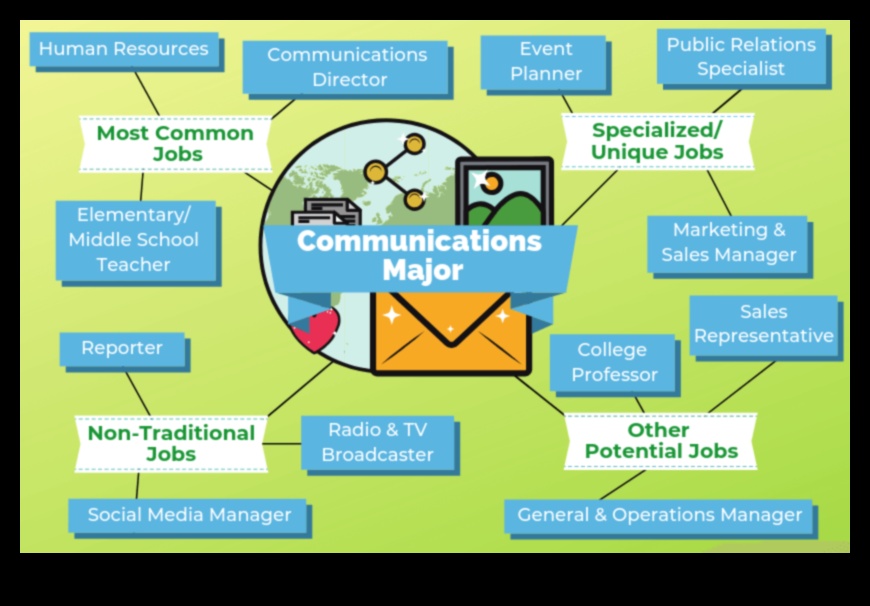
II. Types of Communication Jobs
There are a wide variety of communication jobs available, each with its own unique set of skills and requirements. Some of the most common types of communication jobs include:
* Public relations specialists
* Marketing managers
* Technical writers
* Sales representatives
* Customer service representatives
* Media relations specialists
* Speechwriters
* Editors
* Journalists
* Interpreters
* Translators
These are just a few examples of the many different types of communication jobs that are available. With a communications degree, you can find a job in a field that interests you and that allows you to use your skills and talents to make a difference in the world.
II. Types of Communication Jobs
There are many different types of communication jobs available, depending on your interests and skills. Some of the most common types of communication jobs include:
- Public relations
- Marketing
- Advertising
- Sales
- Media relations
- Journalism
- Broadcasting
- Graphic design
- Web design
- Social media marketing
Each of these types of jobs requires a different set of skills and qualifications, so it’s important to do your research and find a job that’s a good fit for you.
III. Skills Required for Communication Jobs
The skills required for communication jobs vary depending on the specific role, but some common skills include:
* Written communication skills
* Oral communication skills
* Interpersonal skills
* Problem-solving skills
* Teamwork skills
* Leadership skills
* Critical thinking skills
* Research skills
* Media literacy skills
* Technology skills
In addition to these skills, communication professionals also need to be able to adapt to change, work independently, and meet deadlines.
V. Salary and Benefits for Communication Jobs
The median annual salary for communication jobs is \$61,150, according to the Bureau of Labor Statistics. However, the salary range for these jobs can vary significantly, depending on the industry, the company, and the level of experience.
For example, communication jobs in the tech industry typically pay higher salaries than communication jobs in other industries. Similarly, communication jobs at large companies typically pay higher salaries than communication jobs at small companies. And finally, communication jobs at the senior level typically pay higher salaries than communication jobs at the entry-level.
In addition to salary, communication jobs typically offer a variety of benefits, such as health insurance, paid time off, and retirement plans. The specific benefits that are offered will vary from company to company, so it is important to research the benefits package before accepting a job offer.
Overall, communication jobs offer a variety of salary and benefits options. By considering the factors discussed above, you can find a communication job that is the right fit for you.
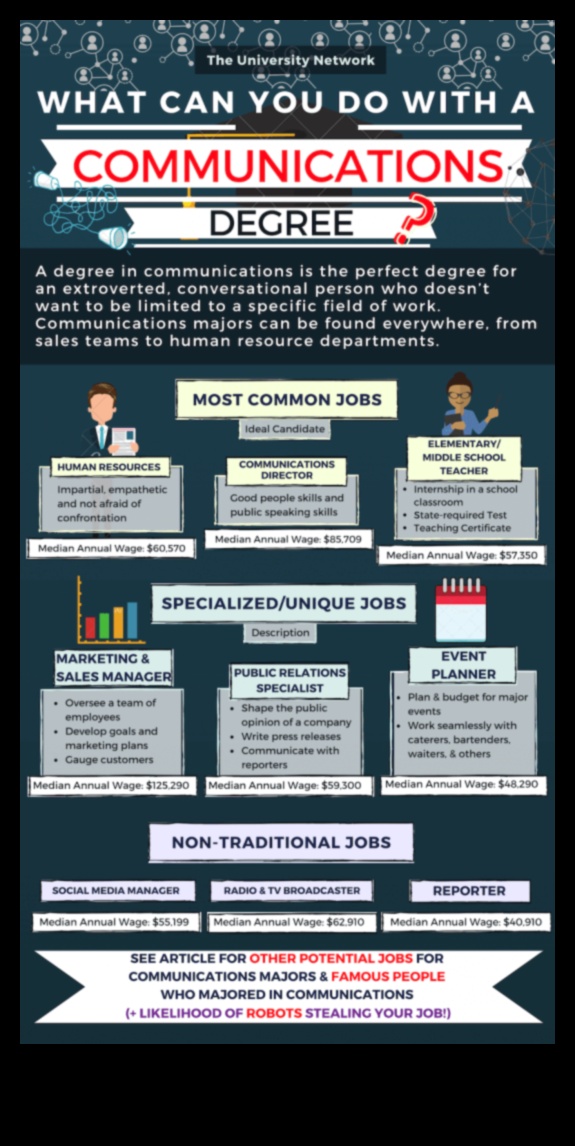
VI. Job Outlook for Communication Jobs
The job outlook for communication jobs is generally positive. The Bureau of Labor Statistics projects that employment in the communications field will grow by 10% from 2020 to 2030, faster than the average for all occupations. This growth is expected to be driven by the increasing demand for communication professionals in a variety of industries, including marketing, public relations, and customer service.
Specifically, the following communication jobs are projected to have the fastest growth over the next decade:
* Public relations specialists: 13%
* Marketing managers: 11%
* Advertising managers: 10%
* Customer service representatives: 10%
* Technical writers: 9%
* Speech-language pathologists: 8%
* Editors: 7%
* Social media managers: 7%
* Media relations specialists: 7%
The median annual salary for communication jobs is $61,150. However, salaries vary depending on the specific job title, industry, and level of experience. For example, public relations specialists earn a median annual salary of $66,160, while marketing managers earn a median annual salary of $129,170.
Overall, the job outlook for communication jobs is positive. There is a growing demand for communication professionals in a variety of industries, and salaries are generally competitive. If you are interested in a career in communications, there are many opportunities available.
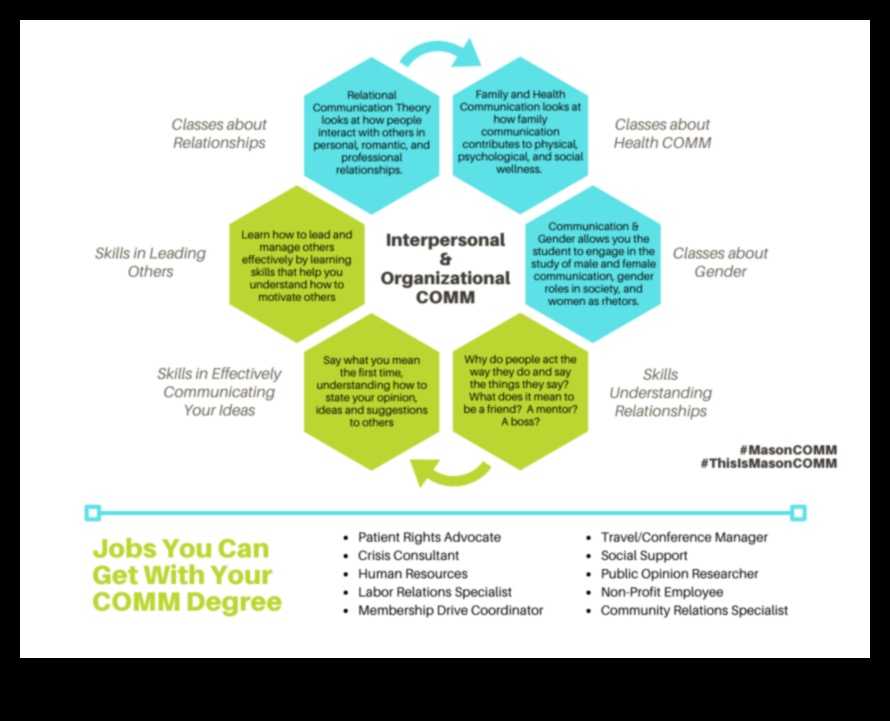
VII. Tips for Getting a Communication Job
Here are some tips for getting a communication job:
- Network with people in your field. Attend industry events, join professional organizations, and reach out to people on LinkedIn.
- Get involved in extracurricular activities that relate to your field. Volunteer for a cause you care about, or start your own blog or podcast.
- Build your skills and experience. Take classes, attend workshops, and get internships or part-time jobs in your field.
- Tailor your resume and cover letter to each job you apply for. Highlight your skills and experience that are relevant to the position you’re applying for.
- Practice your interview skills. Research the company and the position you’re applying for, and prepare answers to common interview questions.
- Be yourself and sell yourself. Be confident and enthusiastic during the interview process, and let your personality shine through.
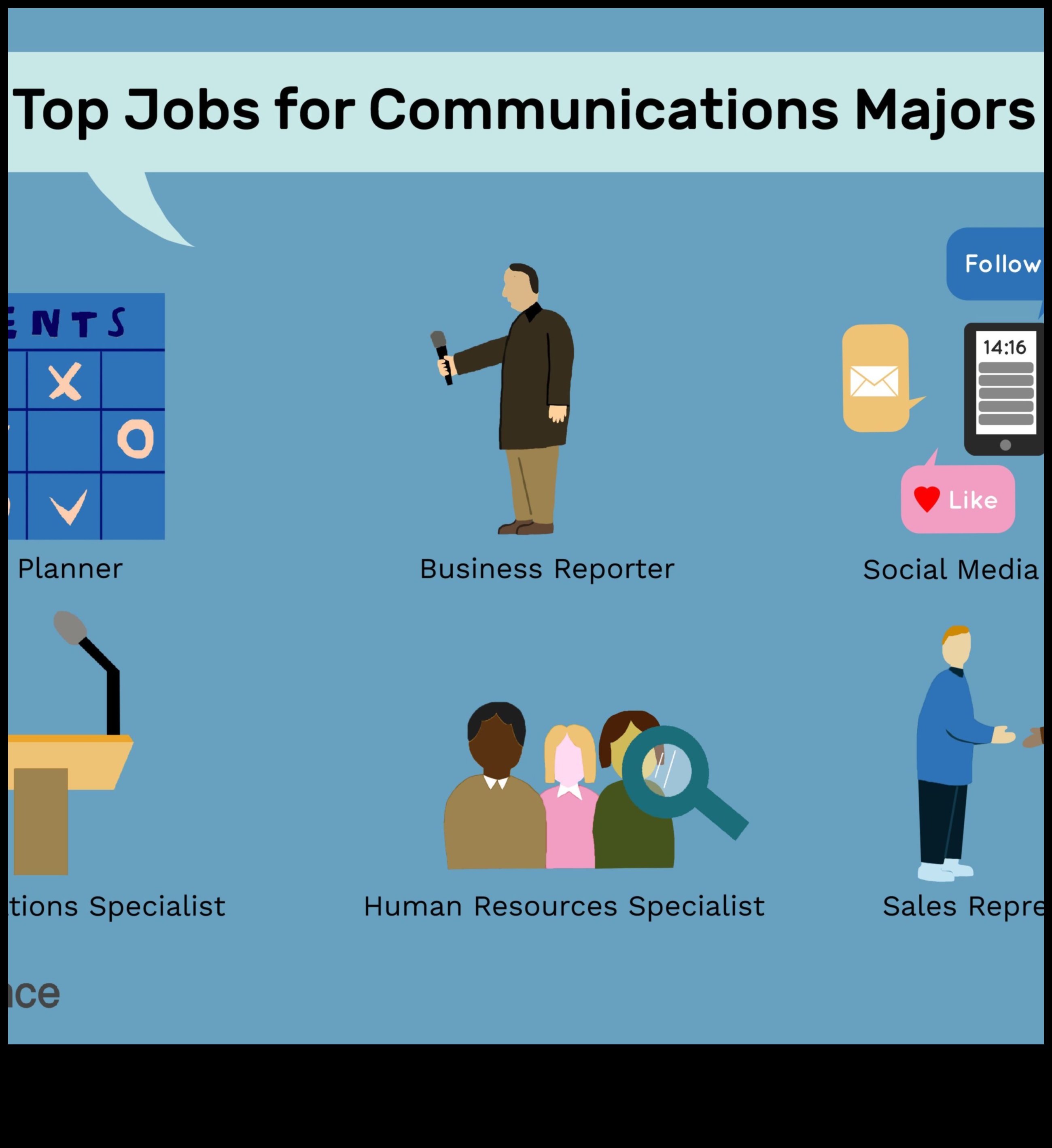
VIII. Common Mistakes to Avoid When Applying for Communication Jobs
When applying for communication jobs, it is important to avoid making common mistakes that can cost you the opportunity to interview. Here are a few of the most common mistakes to avoid:
- Not tailoring your resume and cover letter to the specific job you are applying for.
- Using a generic resume and cover letter that you send to every job you apply for.
- Making grammatical or spelling errors in your resume or cover letter.
- Not being specific about your skills and experience.
- Not highlighting your accomplishments.
- Not being clear about your career goals.
- Not following up after you submit your application.
By avoiding these common mistakes, you can increase your chances of getting the communication job you want.
IX. Resources for Communication Jobs
Here are some resources that can help you find communication jobs:
FAQ
Q: What types of jobs can I get with a communications degree?
A: There are many different types of jobs that you can get with a communications degree. Some of the most common include:
- Public relations
- Marketing
- Advertising
- Media relations
- Journalism
- Corporate communications
- Government relations
- Nonprofit communications
Q: What are the salary and job outlook for communications jobs?
The median annual salary for communications professionals is $59,430. The job outlook for communications jobs is expected to grow by 11% from 2018 to 2028, faster than the average for all occupations.
Q: What skills and qualifications do I need for a communications job?
The skills and qualifications that you need for a communications job vary depending on the specific position. However, some of the most common skills include:
- Strong written and verbal communication skills
- Critical thinking skills
- Problem-solving skills
- Creativity
- Organizational skills
- Teamwork skills
Q: How do I get started in a career in communications?
There are a few different ways to get started in a career in communications. Some of the most common include:
- Pursue a degree in communications
- Get an internship in a communications-related field
- Volunteer for a communications-related organization
- Network with people in the communications field
- Take communications-related courses